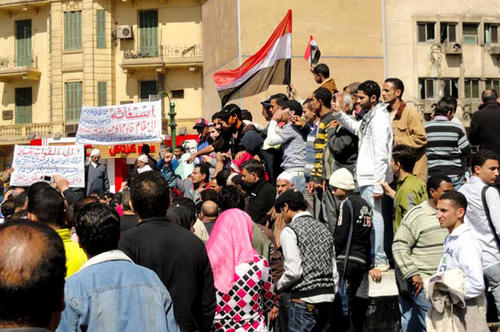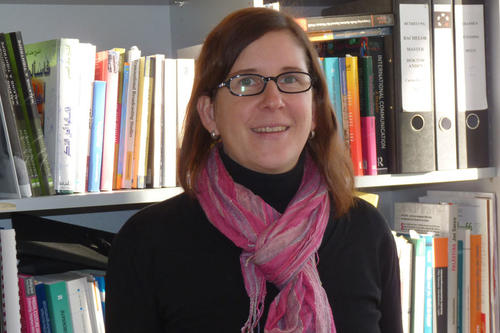Wars, Crises, and Conflicts
Junior professor Carola Richter studies media systems in the Arab world
Jan 28, 2013
German media designated the Egyptian protests that started at Tahrir Square in Cairo during the so-called Arab Spring as a “Facebook revolution.” The photo shown here is from March 2011.
Image Credit: flickr.com / sierragoddess
The political scientist Carola Richter teaches and conducts research as a junior professor at Freie Universität Berlin.
Image Credit: Bianca Schröder
A backpacking trip to Morocco after secondary school first sparked Carola Richter’s interest in the Arabic language and Arab culture. Richter later went on to study communications and media studies at the University of Leipzig, spending a semester at Birzeit University, in Palestine. Since August 2011, Richter, now a junior professor, has been teaching international communication at the Institute for Media and Communication Studies at Freie Universität Berlin. Her concentration: media systems in the Arab world.
Richter has traveled to almost every Arab country, either on her own or as part of a delegation. Recently, she has been especially interested in conducting research on Egypt, where, she says, the media landscape has seen the development of oligarchic structures in recent years – similar to the situation in many countries in Eastern Europe.
Still, Richter has seen positive developments emerge. “Even this pseudo-liberalization has led to some media outlets reporting freely, and very quickly, during the 2011 crisis.” She also points out that the transformation of Egypt’s media is being monitored with a critical eye by communication scholars at Egyptian universities.
Some of those scholars are scheduled to visit Freie Universität as guests in July. During a one-week workshop, they plan to talk with colleagues from Tunisia, Libya, Yemen, and other Arab countries – and, of course, with professors and doctoral students from the Institute for Media and Communication Studies at Freie Universität.
Richter helped to organize the meeting, which is being financed by the German Academic Exchange Service (DAAD), at the International Center for Journalism at Freie Universität. The meeting will focus on general questions, such as “how teaching and empirical research are approached in the different countries, what kinds of publication opportunities there are, and what the general understanding of science and academia is,” she says.
With regard to teaching, in particular, the junior professor expects the exchange to be a fruitful one. “We will be able to learn how lectures in front of an audience of 500 students are handled in Egypt, for example. Our colleagues from Arab countries might be interested in some of the methods we use, such as e-learning, electronic exams, and the like.”
After studying in Leipzig, Richter earned her doctorate at the University of Erfurt. Her dissertation was written on the topic “Media Strategies of Egyptian Islamists in the Context of Democratization.” She already knew Berlin well when she started out as a junior professor in Dahlem. Richter, 35, settled into her new surroundings quickly, and she is pleased at the faculty’s dedication to “really making the Institute a powerful force and pushing progress.” She is also involved in these efforts, including in her role as co-founder and co-publisher of the German edition of the Global Media Journal, which is dedicated to international communication processes.
The huge interest from students in Berlin in her master’s degree course “The Middle East Conflict and the Media” surprised Richter – pleasantly so. “Most of the students don’t have a pre-established opinion; they are open and curious.” Richter herself has worked in depth on how German media report on Arab countries.
In her initial lecture, in June 2012, she criticized the popularity of the term “Facebook revolution,” which was heavily used by German journalists during the “Arab Spring.” She expressed skepticism regarding the grass-roots democratic character of the revolution as implied by this term. Richter says that in Egypt, for example, Facebook is not used primarily to keep in touch with personal contacts, but instead has become a kind of “privatized news agency” in recent years. The most influential players, she says, are based at institutions or are at least also organized offline.
In a study conducted on behalf of the Heinrich Böll Foundation, Richter examined German media reporting on China in 2010. She found that there were similarities with reporting on the Arab world. “In both cases, we see the problem that the only things reported on are wars, crises, and conflicts.”
When it comes to China, Richter says, there is palpable fear of economic competition, while reports on the Arab world are frequently charged with a religious component. Reports on the conflict between Israel and Palestine, for example, frequently speak of “radical Islamist organization Hamas,” even if the actual subject is that of territorial conflict.
But can academic studies do anything about this? “Yes, at least a bit,” Richter says. Her study on China has brought feedback from a number of journalists who have given further consideration to the criticism expressed in the study. The study had rated the balanced reporting in the Frankfurter Allgemeine Zeitung as especially positive. Still, Richter does not want to recommend reading a specific newspaper. “There are political tendencies everywhere. To get comprehensive information, you really have to read a wide variety of sources!”
Further Information
Prof. Dr. Carola Richter, Freie Universität Berlin, Institute for Media and Communication Studies, International Communication, Tel.: +49 30 838-58898, Email: carola.richter@fu-berlin.de


